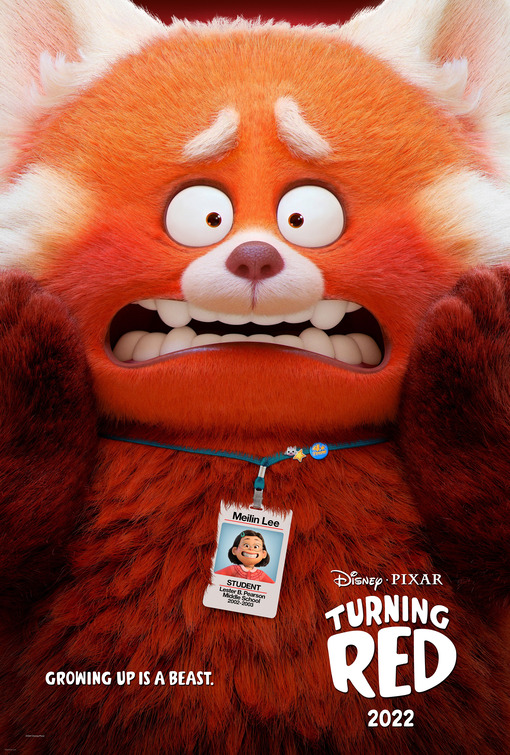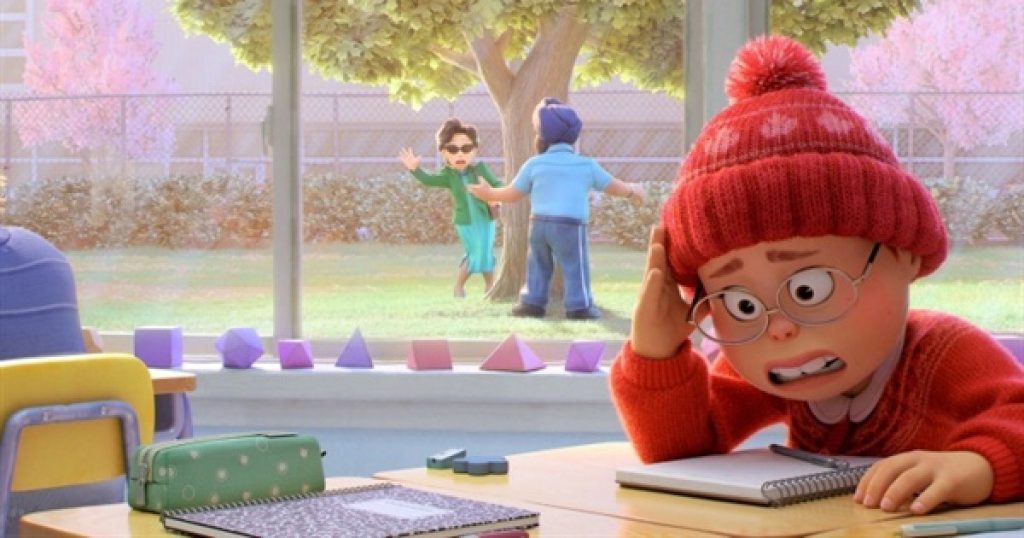
Right from the start, the protagonist at the center of Turning Red puts the word of God on blast — specifically, the fourth or fifth Commandment (depending on the biblical translation). “Honoring your parents sounds great”, she says, “but “if you take it too far, well you might forget to honor yourself. Luckily I don’t have that problem.” That’s Meilin Lee’s self-centered mantra in nutshell. She adheres to it like a religion. Yeah, she’s a confident adolescent, but at what cost?
I greet the release of a new Pixar movie as something of an event. Historically they’ve done some of my favorite animated movies: the Toy Story series, Monsters, Inc, Finding Nemo, The Incredibles, WALL-E, Up, Inside Out. Coco is the last essential entry. Pixar’s ability to turn out one classic after another during their first two decades (1995 – 2015) was unprecedented. I still enjoy their output, but the bloom is off the rose. Sequelitis and imitation have typified the studio’s ideas as of late.
Turning Red is a tale set in 2002 about a 13-year old Chinese girl living in Toronto, Canada going through puberty. Meilin (Rosalie Chiang) — “Mei” for short — is experiencing some changes. Whenever she gets emotional, she turns into a big red panda. Initially, her mother (Sandra Oh) suspects something else. “Did the red peony bloom?” she asks. Later the mother embarrasses her daughter by driving up to her school classroom. With her teacher and entire class present, Mom openly screams “Mei-Mei! Tell him you forgot your pads!”
Formulas in Disney/Pixar movies evolve. The films that involve absentee or deceased parents (Snow White, Cinderella, The Jungle Book), and nurturing mothers (Bambi, Dumbo) have given way to the era of the domineering matriarch. As proof, I submit Tangled‘s villainous Mother Gothel, the abuelas in Encanto and Coco, Joe Gardner’s mom in Soul, and Queen Elinor in Brave — a mother that vexed her daughter so much that young Merida turned her into a bear.
The matriarch at the center of Turning Red is a tyrannical perfectionist. Incidentally, Father (Orion Lee) is inobtrusive. He acts more like an older brother. Jin Lee is rarely permitted to speak. When he does, he offers supportive words of encouragement. But this isn’t about him. Back to Ming Lee. She runs a temple in Toronto, leading visitors through tours of the ancestral family shrine. Instead of worshiping a god, they kneel before a portrait and idolize an ancestor named Sun Yee. That’s different. Sun Yee was granted the ability to transform into a red panda to protect her village from rampaging attackers. Unfortunately, this magical “blessing” was also bestowed upon every woman in the family when they come of age. Later they must perform a pagan ritual to contain the spirit of the beast within a talisman.
Mother’s controlling ways reach a disturbing zenith. Daughter Mei is consumed by raging hormones. Now the poor girl is dealing with the changes in her body. Mei has an innocent crush on a 17-year-old clerk at a local convenience store. He is unaware of her lust. Mei’s doodles in her notebook of him with muscles send Ming into a state of panic. Instead of addressing it with her daughter, she chastises the oblivious object of her desires down at the store. The customers look on in astonishment. The boy is understandably confused. The script also goes off on a detailed tangent about a teen boy band called 4★Town. Her mother fiercely disapproves of this quintet as well. “Why are they called 4★Town if there’s five of them?” Now THAT’S funny. Ming is not a fan of her friends either. She believes Miriam is a bad influence. Is there anyone this woman does like?
The personalities grow way past unpleasant to the point of offensive. Ming is an unyielding control freak with overbearing — borderline oppressive — demands. Mei regards Mom as an irritant in her life. When Ming refuses to let her go to a concert, it’s not a problem. Mei is a willful girl and will go anyway. Lying and hiding things from her parents is kind of her thing. Mei is committed to her ethnically diverse group of friends. Miriam (Ava Morse), Priya (Maitreyi Ramakrishnan), and Abby (Hyein Park) comprise the center of her life. Thoughts of her besties evoke serenity. She uses these feelings to calm her inner panda. Ok, let’s recap: Mother = bad. Friends = good. I get that might mirror the mindset of some teens, but it’s not a quality to champion, nor did it endear me to her personality.
There has never been a cartoon quite like Turning Red. When a politically-charged slogan is appropriated as “My Panda My Choice” you know this is not your father’s Pixar. It’s a definite shift for the studio. Art echoes the artist. Writer/director Domee Shi has created a deeply personal work. It tackles the biological changes of a girl becoming a woman head-on without flinching. Therein lies the innovation. It also reflects an ongoing push for more Asian Representation. The animation deserves mention. The dazzling style which draws on the traditions of anime is consistently impressive. The facial expressions are a particular standout. Yet the narrative is weak. After an interesting start, the story ultimately devolves into a pedestrian monster flick. The production lazily cribs from disparate sources like The Incredible Hulk and Teen Wolf to fashion an obvious metaphor for puberty. The chronicle occasionally loses focus. Did we need to learn the names and personalities of every boy band member? But most problematically, the main characters are supremely unlikeable. Ming is unhinged. Mei is egocentric. “I do what I want, say what I want, and I do not hesitate to do a spontaneous cartwheel if I feel so moved.” Hey, you do you girl but I’mma get going.
03-11-22


2 Responses
2 ⭐️. This was clearly made for little girls. It didn’t have a universal appeal. Had it been written better, or if the main character was a little more likable, maybe I would’ve caught on.
Definitely skews more toward an older tween/early teen audience than any other Pixar film.